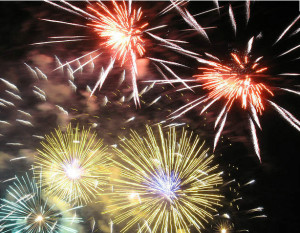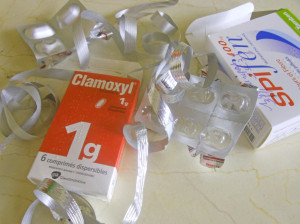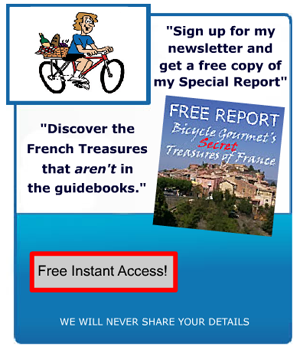Other Recent Articles
French Country Travel Life New Years
French Country Travel Life New Years? Yes, there was one. And it were grand. But, “low key.” ( a unmistakeable sign that you are over 18) Seems to be a great majority of the froggie populace celebrating in the same style. At Home. A few pals. (or not) Some great grub. Even greater wine. Obligatory Champagne. Two reasons DA BG imagines: One, country folk often have fair distances between friends ‘n neighbours. Two, City dwellers don’t view “stuck-in-midnight-massive-traffic-jam” as a form of celebration.
One familiar feature missing from the French National festivities this year, was the (usually) traditional fireworks display from Le Tour Eiffiel. Most o’ the time when skyrockets are nixed by the powers that be, it’s during dry times, with a lack of available water. For fear of fire. Not the case here. The other possibility – economic. Alright we DO have a socialist government now, but dumbing down a National celebration(in the nations capital yet!) is not the height of political sagess. N’est ce pas? So – we can rule that one out. The other, to me anyway, curious aspect of “no fireworks 2013” is the fact that the Eiffiel display is a great tourist promotion vechile. One that lasts long after the actual event. (hint : it lives forever on youtube!) But, as the religious fanatics are always reminding us : “It is not for us to know.” And, bottom line, is probably causing no one sleepless nights expect roman candle salespersons.
However, as marvy as New Years Eve was, and as Super as the sleep that followed it, the dawn arrived with an (very)unwanted guest in BG land. LE GRIPPE! – what we in the far away lands call: “The Flu.” Not immediately apparent, except for a small sensitivity in the chest, I saw no reason not to begin the day, with a brief consitutional through my adjoining woods. No problem. Then, returning to Chateau BG – the proverbial “ton o bricks.” Instant agony. Sweating like a….you know what…..aching everywhere. Especially neck, chest and back. After a few hours, the fever subsides, but the aches remain. Of course, you lie to yourself that it can’t possibly last. (Been there, done that?)
That night, next to no sleep. The next – None. For the very understandable reason that no position – sitting, standing or lying down – provides any relief. So, uh….maybe time to see Monsieur le docteur? Absolutement!
Loaded down with, and popping the prescribed pills, huge improvement in “pain-be-gone” status within the first four hours. That night. First good sleep. (chemically enhanced.) Progressively mo beddah each day. Hopefully will begin training for the next Iron Man soon.
The mystery, like the “no fireworks this year” one, is why? Being in the prime of BG -dom, not to mention being exceptionally prudent with my intake of grub and grog – why did my number come up on the “flu-be-you” card?
Remember the Waltons? “Life is a mystery son…a sacred mystery.”
THROW ME A BONE HERE, PEOPLE!
What are ya thinkin’?
Best French Wines – Domaines or Negociants? – Part Two
Best French Wines – Domaines or Negociants? – Part Two Does have it’s own unique charm. (Would DA BG foist anything “uncharming” upon you?) However, catching up withPART ONE might add to your charm, not to mention knowledge/appreciation quotient. n’est ce pas?

Freedom is négociants’ favorite word (although they’ll also admit it can be a double-edged sword). “As a négociant you have the freedom to pick from 21 different plots to make a wine,” said Patrick Leflaive. The owner of a domaine can work only with the vineyards he has. Of course, as Mr. Potel admitted, there is also an attendant uncertainty in buying the fruit rather than owning it. (Most négociants have handshake agreements, not written contracts, with the growers in his part of France.)
And unlike in Roussillon, in Burgundy the competition for grapes can be fierce—and the cost often high. “There is a big pressure in terms of price,” noted Mr. Potel. “Ten years ago it was much easier.” The price of grapes in Burgundy has doubled, even tripled compared with five years ago, said Mr. Potel, who feared producers would price themselves out of the market. “We do not want to be like Bordeaux, killing the market,” he said, a reference to the ever-escalating prices of the best wines of that region. “We are on the cliff right now—it can go one way or another.”
American négociant Cameron Hughes has a rosier view of the future. Flush with success from buying wine from prestigious (but unnamed) vineyards and wineries in California and reselling them under his name, Mr. Hughes has recently moved into Europe. He’s buying wine everywhere from Brunello to Bordeaux to Burgundy to Côte-Rôtie—”A-plus stuff at great prices,” he said. The wines, ranging from $8 to $50, will be in the market next month. What’s his secret? How does he get so much good wine? Cash, along with the right contacts and good distribution, said Mr. Hughes.
Contacts, distribution, improved winemaking techniques: The reasons these négociants offered for their success sounded like many of the same reasons that top domaines were doing well. Perhaps they weren’t so far apart after all? Jean-Luc Colombo, a consultant, a négociant and the owner of a Rhône Valley domaine, doesn’t think so. In fact, there are so many domaines making second labels or wines on the side, Mr. Colombo declared, “everyone is a négociant today.”
Read More HERE.
THROW ME A BONE HERE, PEOPLE!
What are ya thinkin’?
Author’s Note : This is my last post of 2012. After all, Christmas IS just around the corner. Have a safe happy one! I think it would be fab, gear and groovy if we were to meet up again in 2013. N’est ce pas?
Best French Wines – Domaines or Negociants – Part One
Best French Wines – Domaines or Negociants – Part One …will be for some of DA BG’s faithful a (short) trip down “wine education lane.” While others (that would be the “glass with every meal except breakfast” crowd) the following will be the news of many yesterday’s past.
Alllllllrighty then – let’s dive in! French Wines come from two sources. Domaines – that is, established, regular, ain’t goin’ anywhere, fixed establishments with their own grapes. And “Negociants.” They being those who buy what they deem to be the best French Wine Grapes, then blend and sell them.
As you would well imagine dear reader, there is more than a little snobbery with regard to the wines of Negociants. But is it valid?(the larger question, bien sur – is snobbery ever valid? – for another time, and truthfully, another writer!)
But staying “on topic” and filling our information glass to the brim on this subject is my fellow award winning scribbler and wino-holic from TheWall Street Journal – Ms Lettie Teague….
The French word négociant means a dealer or merchant of wine. A négociant typically purchases grapes, wine or must (fermented or unfermented juice) and puts his own label on the final product. Unlike with a wine made at a domaine (a winery that makes and bottles its own wines), the components and the creation of the wine can be a bit of mystery, not just to a buyer but sometimes even to the négociant himself.
Of dubious quality and questionable provenance, négociant wines were often quite cheap but rarely good deals—at least until recently. Today’s top négociants—whose spiritual home may be in Burgundy but who work all over the world—are producing higher-quality wines and are often engaged with the winemaking and the viticulture.
Jean-Charles Boisset, whose family owns one of the biggest négociant companies in Burgundy, said that back in the 1960s, his parents “just bought the wine and put their name on the label” but that he works directly with the growers themselves. In fact, Mr. Boisset—who calls himself a “viniculturalist” and not a négociant—posited on a recent phone call that “the négociant has taken over the role of the grower.”
Mr. Boisset owns 19 wineries in France and America and produces both domaine and négociant wines, as do quite a few of his peers, including established Burgundy producers like Maison Olivier Leflaive in Puligny-Montrachet and newer players like Nicolas Potel in Beaune. Mr. Potel founded Maison Roche de Bellene in 2008 after being forced out of his family company, Maison Nicolas Potel, a négociant firm.
Mr. Potel owns almost 60 acres of vineyards in Burgundy, and brothers Olivier and Patrick Leflaive own parcels in both premier cru and grand cru vineyards that were recently returned to their family after the lease with their cousins at Domaine Leflaive ended, but they are all well versed in the prejudice against négociant wines. Patrick Leflaive has addressed it directly by setting up blind tastings for sommeliers that included both his négociant- and domaine-bottled wines. “Most of the time, they considered the négociant wine the better wine,” he reported with satisfaction over a recent lunch in New York.
Sommeliers have been some of the most vociferous critics of négociant wines, according to Michael Madrigale, head sommelier of Bar Boulud and Boulud Sud in New York. Some of his fellow professionals won’t even put négociant wines on their lists, said Mr. Madrigale, who disagrees with this “knee-jerk” estimation.
Although Mr. Madrigale is admittedly a big(ger) fan of domaine-bottled wines, he has been impressed by some of the good values from Burgundy négociants like Robert Drouhin, Deux Montille, and from Hecht & Bannier, a négociant company based in the Roussillon region of France. “I didn’t even know Hecht & Bannier was a négociant company,” confessed Mr. Madrigale. “I was just impressed with the wines—I thought they really spoke of a place.”
I hadn’t known that Hecht & Bannier was a négociant either when I first tasted its wines a few years ago. Like Mr. Madrigale, I’d been impressed by their depth of flavor, concentration and finesse. But I didn’t understand why Grégory Hecht and François Bannier didn’t own their own vineyards—after all, land is a lot cheaper in Roussillon than it is in Burgundy, where a vineyard acre might cost millions of euros. (By contrast, an acre of old-vine Grenache in Roussillon costs as little as €10,000, or $12,700.)
Why not own vineyards? I asked Mr. Hecht, who replied that there was no reason to buy land when there wasn’t much competition for top-quality grapes. The firm could get all the fruit that it needed from all the best places in the region: “Imagine you can bottle a Pauillac which would be a blend of Mouton, Latour and Lafite,” he wrote in an email. “This is the freedom we have chosen.”
Read more HERE.
PART TWO – Next Time.
THROW ME A BONE HERE, PEOPLE!
What are ya thinkin’?




